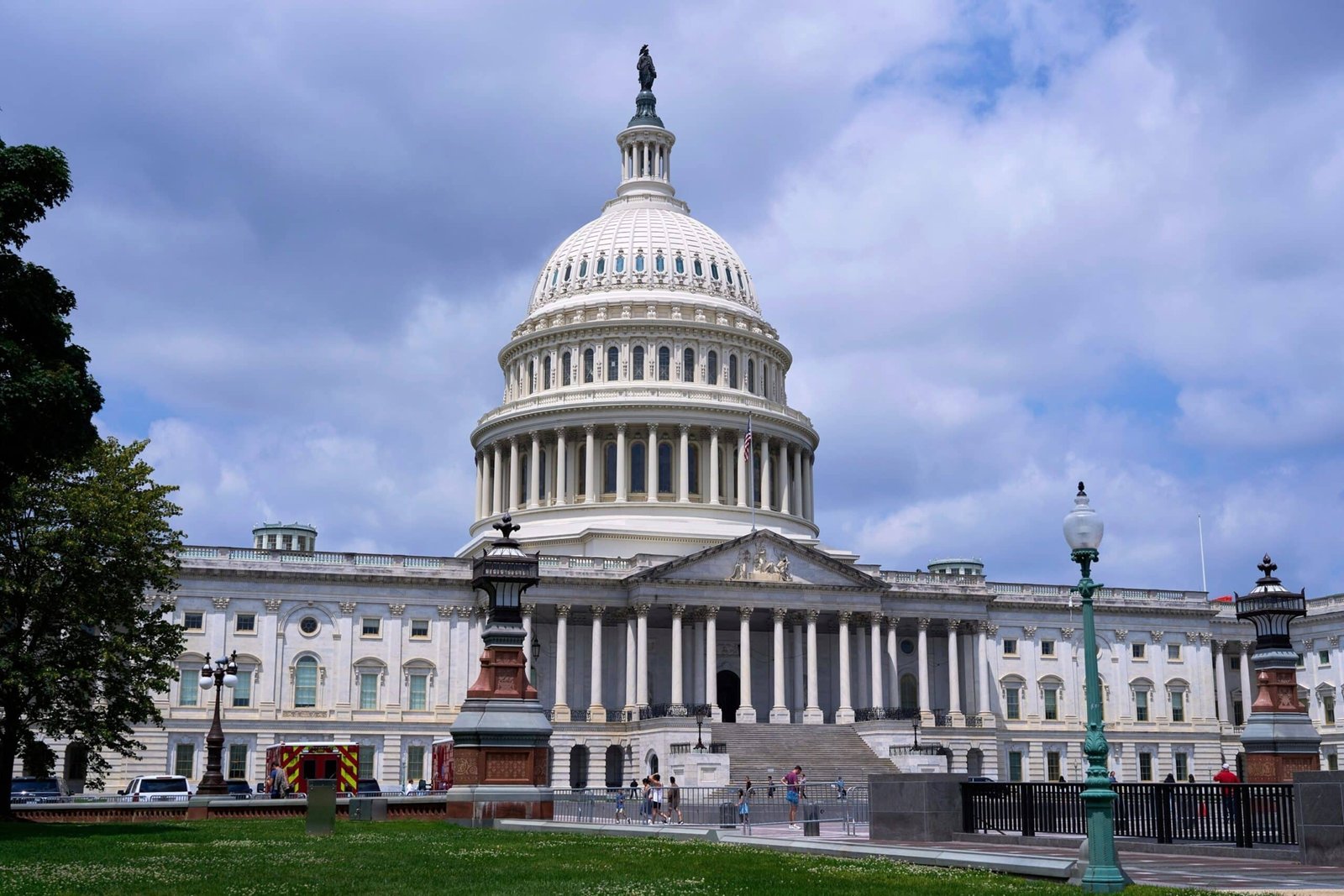The Senate Financial Committee version of the ‘Big Bill, Indah’ makes the potential match with home

Although the majority of the Republican senate left a closed briefing about the newly released provisions in the Senate Financial Committee section of President Donald Trump to fund a second term agenda, it was enough to bring up major concerns which might mean a complicated path for the law.
The majority leader of the Senate John Thune was able to lose only three Republican senators when Trump “Big and Indah Bills went to the Senate floor.
At present, there are no three who explicitly state that they will choose to oppose the package, but at least there are many that cause very serious concerns about the bill, questioning whether the big package will have the support needed to pass the Senate.
Senator Ron Johnson, an eagle deficit that has long criticized expenses in the bill, said he did not support him “at this point.”

Capitol was seen in Washington, June 9, 2025.
J. Scott Applethite / AP
“We did nothing to significantly change the way of the past and the future in this country,” he said, noting that when the Congress Budget Office report came out this weekend, “you will only see why I am not too excited” in the law.
“There are many good things about what homes do,” he added. “The problem is just not to meet that moment.”
Johnson also insisted that the bill would not reach Trump’s table with the deadline for the Republic of July.
“No, not in July. It is impossible. We have not done the discussion we need,” he said.
Senator Josh Hawley said he was “worried” with what he heard at the meeting. His biggest concern is that the Medicaid change in the provider’s tax can endanger the rural hospital in Missouri.
“This is a totally new system that will be effectively shaved rural hospitals for what? Paying solar panels in China? I mean, this requires a lot of work, in my view,” he said.
Senator Rick Scott said that while he was optimistic about the bill, he had a serious concern about the provider’s tax provisions.
“I am an optimistic person, okay, that we will all be able to gather and we will get fiscal sanity and we will also ensure that countries like mine that do not expand their Medicaids is not treated unfairly,” said Scott.
Senator Rand Paul is also expected to oppose the law because the language that will increase the federal debt limit of $ 5 trillion.
Apart from the objection, the majority of the Republic Senate seemed optimistic about the state of the bill.
Senator Steve Daines remains optimistic about Thune’s ability to get bills across the finish line.

The majority leader of Senate John Thune responded to questions from the news media when he walked to his office in Capitol in Washington, June 5, 2025.
Shawn Thew/Epa-Efe/Shutterstock
“He was sent every time he needed, whether it was in the budget resolution, the reconciliation bill, for a year [continuing resolutions] – He hit a thousand, “said Daines.” Always difficult, but he said it. I won’t, I will not bet against him now. “
Republicans use a legislative procedure called reconciliation, which is limited to taxes and expenses, to try to get bills that are approved by a simple majority. But DPR Speaker Mike Johnson has warned the senate to make minimal changes to the bill to ensure it can be ratified, given the thin margin in the lower room.
There are also a number of senators who have conditioned their support for the bill on certain proposals in the senate version.
The following are the potential sticky points in the Law:
State and Local Tax Ship
The Senate Law as prepared will maintain the State and Local Tax Limits (SALT) at $ 10,000 per year, while the DPR bills offer a reduction of up to $ 40,000 per year for those who produce less than $ 500,000 per year.
Some Republican houses say they will choose not to the final bill if the reduction is lower than $ 40,000 they negotiate with difficulty.
Senator said the $ 10,000 limit is currently only a placeholder, not yet finished, and is still being negotiated. Including the value that allows the Non -Partisan Congress Budget Office to start printing the bill, but Senator said the score could be modified when the salt hat changed.
Senator Markwayne Mullin, who has become a key negotiator with the Republicans House on SALT, is actively in talks with a hardliners of Salt Republican, Rep. Mike Lawler, who said after the text of the Senate Financial Committee dropped on Monday that he would not support the bill if sent to the DPR with current changes.
“I talked to Mike about it. Yes, we understood it. We were in …” he stopped, “place,” Mullin said.
Medicaid
Similar to the DPR version, the Senate Bill implements work requirements on Medicaid for “capable adults who choose not to work and do not have children who are dependent or elderly parents in their care.”
It also increases the frequency of feasibility verification for healthy adults.
Healthy bodied adults can work, participate in job training programs, register in schools, or volunteer for 20 hours per week to receive the coverage of medicaid subsidized taxpayers.
This also ended the Medicaid payment funded by taxpayers for gender abortion services and procedures and ensured that immigrants who did not have permanent legal status did not receive the Medicaid allowance.
The biggest difference between the Parliament and the Senate plans to reduce “waste, fraud, and abuse” in Medicaid involving the tax provider, the tax forced by the state for health care providers used is mainly used to help finance the State Medicaid program. Starting in 2027, the Senate Law will reduce the tax provider of health services in countries that choose to expand Medicaid to 3.5%, down from 6% in the DPR Bill, which means the state burden to fund Medicaid can be higher below the Senate version.
Tax
The senate version permanently expanded the 2017 Trump tax deduction, something that according to the Republican Senate was very important for businesses and families who wanted to plan the future.
This also includes no tax on tips and no tax for overtime, Trump’s top priority. This bill allows a reduction of up to $ 25,000 in qualified tips, and reduction of up to $ 12,500 in overtime. Meanwhile, the home version does not have an explicit limit on tips and overtime reduction.
Senate bills will also offer a new tax reduction of $ 6,000 – generous than a reduction in $ 4,000 in the DPR version.
This will also make various permanent businesses and other tax incentives, including issuing investments in equipment and research and development.

Parliament speaker Mike Johnson spoke of discussions with Elon Musk this week when he met with reporters to discuss the work of tax bills and cutting President Donald Trump’s expenditure, in Capitol in Washington, June 4, 2025.
J. Scott Applethite / AP
Children’s Tax Credit
The Senate Bill explores the child’s tax credit from $ 2,500 in the DPR to $ 2,200 per child. Like home, it does not include family without income.
This bill also sets a savings account for newborns, similar to the DPR Bill.
Debt limit
The senate package includes an increase of $ 5 trillion to the federal debt limit, higher than the $ 4 trillion of the DPR. The congress must act before the beginning of the fall to increase the debt limit or the default risk.
Gradually from IRA Tax Credit
The senate version abolished the solar energy tax loan which is part of the law reduction of inflation at a slower level than the DPR version by allowing more projects to access credit before it ends.
The Senate Bill also eliminated hundreds of billions of IRA subsidized dollars, such as immediately ending the electric vehicle tax credit and “lease loopholes,” similar to the DPR Bill.






